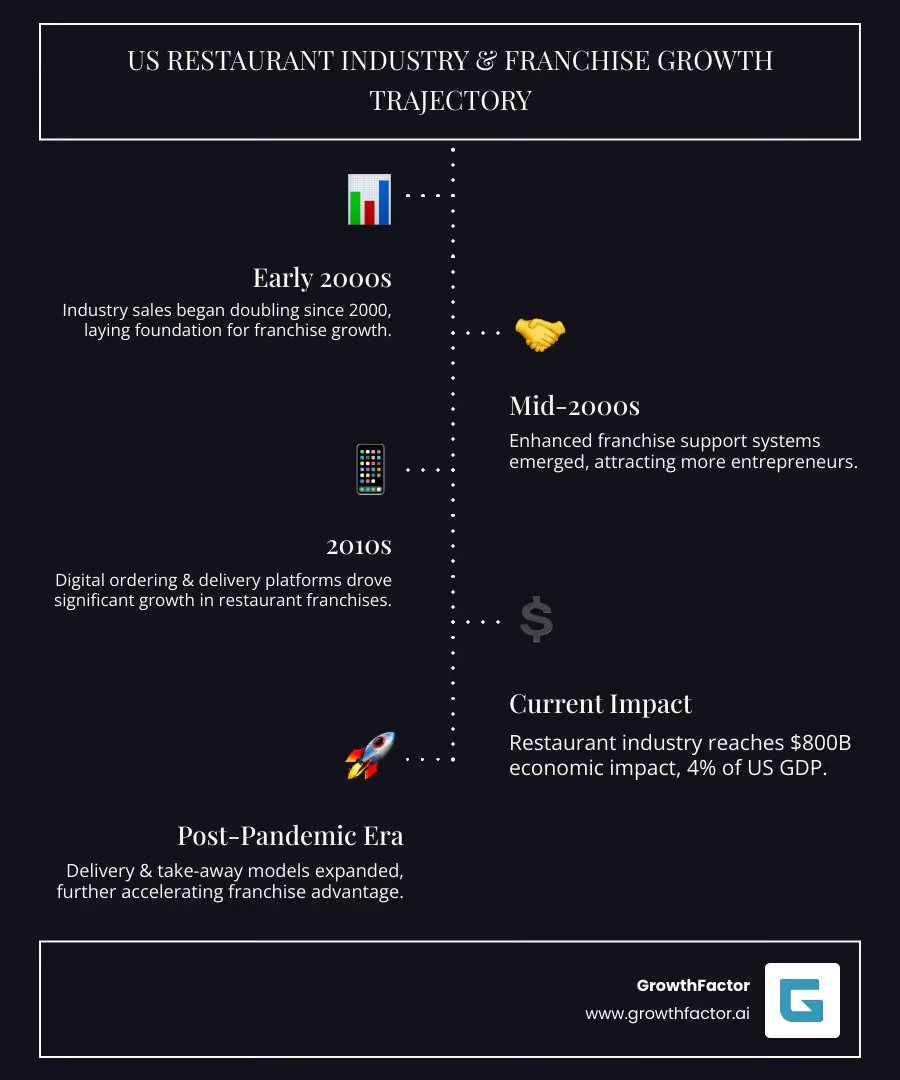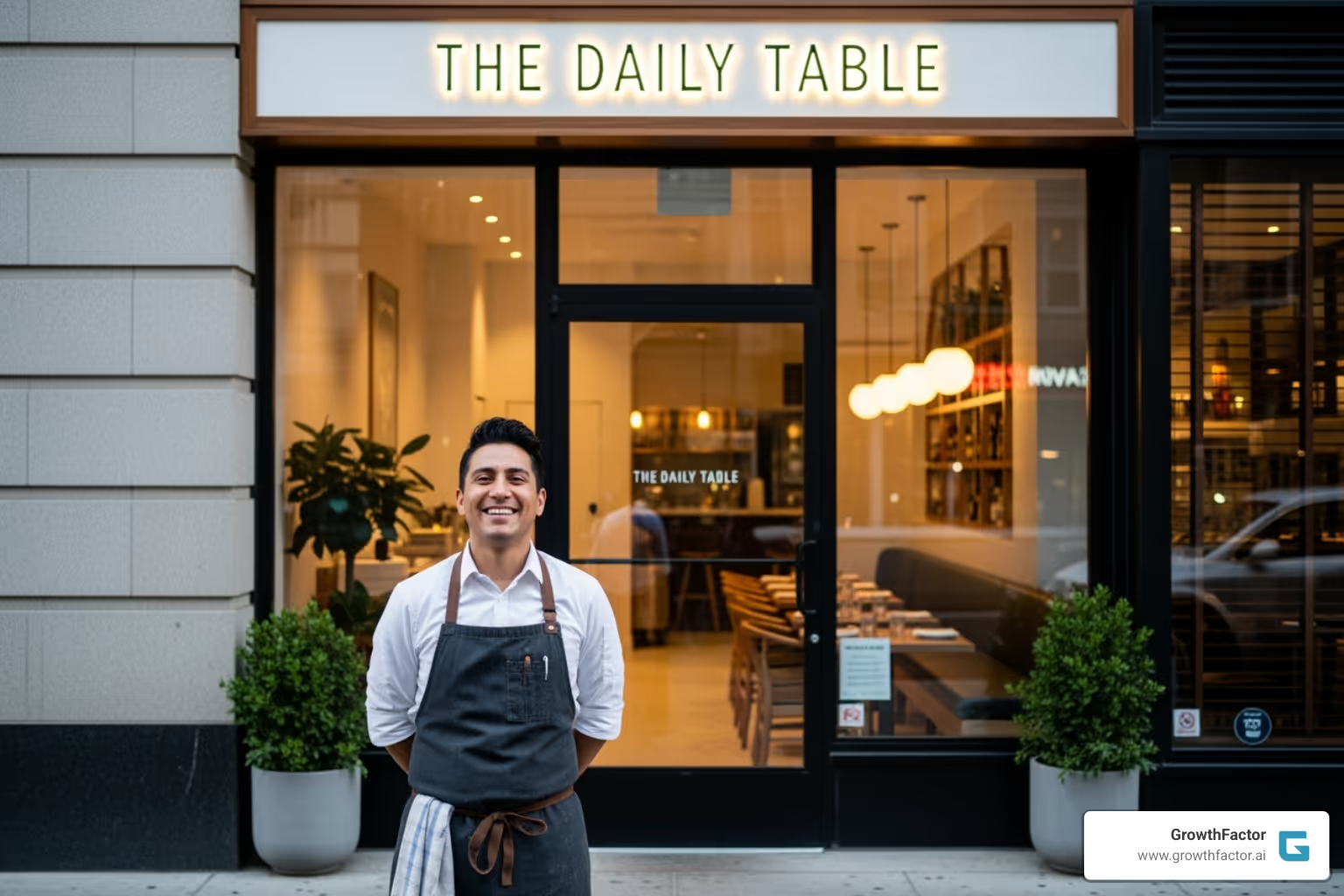From Dream to Dough: Exploring Restaurant Franchise Opportunities
Written by: Clyde Christian Anderson
Why Restaurant Franchises Are Reshaping American Entrepreneurship

Restaurant franchise opportunities offer one of the most accessible paths to business ownership in America. With Americans fueling an $800 billion industry that accounts for 4% of U.S. GDP, franchises provide a proven path to tap into this market.
Unlike independent restaurants, which often struggle for years, franchise businesses tend to recoup their investment quicker. This is due to instant brand recognition, ready-made operational systems, and comprehensive support. Banks recognize this stability, making it easier for franchisees to secure start-up funds.
Opportunities span every investment level and interest:
- Quick Service (QSR): Pizza, burgers, sandwiches ($200K-$500K investment).
- Fast-Casual: Healthy bowls, international concepts ($300K-$900K investment).
- Full-Service: Family dining, steakhouses ($1M-$2.5M investment).
Key financial commitments include an initial investment from $200,000 to over $2 million, royalty fees (5-6% of gross sales), and marketing fees (1.5-3%).
The biggest challenge isn't finding a franchise, but finding the right location. Market saturation and demographics can determine success before you open.
I'm Clyde Christian Anderson, Founder and CEO of GrowthFactor.ai. With over a decade in retail real estate, I've seen that the difference between a thriving and a struggling franchise often comes down to data-driven site selection.

Why a Franchise Beats Starting from Scratch
While creating a restaurant from your own vision is appealing, the reality is harsh: most independent restaurants fail within a few years. Restaurant franchise opportunities offer a different path by letting you step into a business model that's already been tested and refined.

From day one, a franchise provides a brand people already recognize and trust. This translates directly into revenue, as customers seek out the consistent quality they know. This isn't just a logo; it's a complete system including established supply chains, refined operational processes, and national marketing campaigns that would be prohibitively expensive for an independent owner.
When challenges arise, you have an experienced support team to guide you, helping you avoid the costly trial-and-error that sinks many new businesses.
The Financial Advantage
Lenders consistently favor franchise businesses over independent concepts because of their proven financial models and lower failure rates. This preference means franchisees often find it easier to secure financing, negotiate better rates, and access more capital. Banks can use historical data from similar franchises to predict performance, reducing their risk and improving your borrowing power.
This financial edge extends to profitability. Franchisees typically recoup their investment faster because they bypass the years spent building brand awareness. Group buying power also improves your bottom line, with negotiated pricing on everything from food supplies to equipment.
The Operational Head Start
Opening a franchise means starting with an expert playbook. The franchisor has already determined the optimal kitchen layout, workflow, high-margin menu items, and staffing levels. You receive comprehensive training that condenses years of knowledge into a focused program covering operations, financial management, and local marketing.
Ongoing support includes national advertising, social media strategy, and guidance on navigating complex regulations like food safety and labor laws. This foundation allows you to focus on what matters most: delivering an excellent customer experience and engaging with your community. For more on how established systems accelerate growth, explore these market entry strategies used by successful franchises.
The Financial Recipe: What It Costs to Open a Restaurant Franchise
Understanding the financial commitment is essential when exploring restaurant franchise opportunities. You need a clear picture of both upfront costs and ongoing expenses.

The initial investment for a restaurant franchise typically ranges from $200,000 to $2 million, depending on the brand, location, and build-out requirements. Franchisors also set specific minimums for liquid capital (accessible cash) and net worth (assets minus liabilities) to ensure you have a financial cushion.
For example, a breakfast concept like Pür & Simple requires around $400,000 in unencumbered cash, while some QSRs may have lower entry points. Always review the Franchise Disclosure Document (FDD) for precise figures.
Understanding the Upfront Investment
Your initial investment is composed of several key costs:
- Initial Franchise Fee: A one-time payment ($15,000 to $40,000+) granting you rights to the brand and system.
- Real Estate & Build-Out: Often the largest expense, covering the lease, construction, and renovation to meet brand standards. Total costs can range from $800,000 to $900,000 for a concept like Pür & Simple, heavily influenced by local labor and material costs.
- Equipment & Inventory: Kitchen appliances, furniture, signage, and initial food supplies.
- Working Capital: A crucial buffer to cover operating expenses like salaries and utilities before your business becomes profitable.
Here's a general breakdown of investment ranges:
Franchise TypeExample ConceptsTotal Investment Range (Approx.)Liquid Capital (Approx.)Net Worth (Approx.)Quick Service (QSR)Slice of the 80s, Poki Bowl$170,000 - $640,000$0 - $192,000$500,000 - $750,000Fast-CasualPokémoto, Gyro Shack$170,000 - $900,000$0 - $400,000$500,000 - $1,000,000Full-ServiceDenny's Canada, Pür & Simple, Steak n Shake$800,000 - $2,500,000+$400,000 - $1,000,000+$1,000,000 - $2,500,000+
Decoding Ongoing Fees and Terms
Long-term costs are critical for your financial projections.
- Royalty Fees: A percentage of gross sales (typically 5% to 6%) paid to the franchisor for ongoing support, brand access, and system use.
- Advertising Contributions: A percentage of gross sales (usually 1.5% to 3%) pooled for system-wide marketing campaigns.
- Technology Fees: May be charged separately to cover POS systems, online ordering platforms, and other proprietary software.
- Franchise Term: Typically 10 to 20 years, with an option to renew at the end of the term, often for an additional fee. Understanding these long-term commitments is vital for your business plan. For deeper insights into how demand patterns can impact your planning, explore more info about retail demand forecasting.
A Menu of Restaurant Franchise Opportunities
The beauty of restaurant franchise opportunities is the sheer variety, with a concept to match nearly every entrepreneurial vision and budget. Today's landscape is shaped by powerful trends like health-consciousness, the demand for convenience, and the explosion of delivery services.

Types of Restaurant Franchises
- Quick Service Restaurants (QSR): The most accessible entry point, prioritizing speed and convenience. Think classic burger joints like Steak n Shake or pizza concepts like Slice of the 80s.
- Fast-Casual Dining: The industry's fastest-growing segment, blending quality food with counter-service convenience. Concepts like Poki Bowl, Pokémoto, and Gyro Shack exemplify this trend with fresh, customizable meals.
- Full-Service Dining: The complete restaurant experience with table service and higher check averages. This includes classic diners like Denny's Canada, upscale concepts like Chop Steakhouse & Bar, and specialized menus like C-Lovers Fish & Chips.
- Cafes, Bakeries, and Ghost Kitchens: Niche concepts that cater to specific dayparts or the delivery-only market, often with lower overhead.
Hot Trends and Emerging Concepts
- Poke Bowl Franchises: Concepts like Poki Bowl and Pokémoto are perfectly positioned at the intersection of health, convenience, and customization, with significant room for market expansion.
- Greek Fast-Food: Brands like Gyro Shack are proving that Mediterranean flavors offer a compelling and profitable alternative to traditional fast food.
- Breakfast and Brunch Concepts: Franchises like Pür & Simple offer a better work-life balance with 7 a.m. to 3 p.m. operating hours and creative, in-demand menus.
- Plant-Based Options & Technology: Successful franchises are integrating plant-based menu items and robust digital infrastructure for online ordering and delivery to meet modern consumer expectations.
For entrepreneurs looking abroad, many brands are expanding internationally. You can explore restaurant franchise opportunities in Canada, where concepts like Denny's Canada and Pür & Simple are growing.
The Secret Sauce: Franchisor Support and Your Keys to Success
When you pursue restaurant franchise opportunities, you're not going it alone. You gain an experienced partner, but success requires a strong commitment from both sides. Franchisors provide the proven system, while you bring the hands-on leadership to make it thrive locally.

Franchisors seek partners with a passion for hospitality and a willingness to learn their system. While prior restaurant management experience is often required (like the five years Gyro Shack looks for), what matters most is your dedication and leadership potential. Chick-fil-A, for instance, views it as a full-time, hands-on "life investment."
What to Expect from Your Franchisor
You're buying into a support system that includes:
- Comprehensive Training: Immersive programs covering every aspect of the business. Pür & Simple, for example, provides five weeks of theoretical, practical, and on-site opening training.
- Grand Opening & Ongoing Support: Dedicated teams assist with your launch, and field consultants provide continuous guidance to help you steer challenges.
- Marketing and Advertising: System-wide campaigns build brand recognition on a scale an independent operator could never afford.
- Supply Chain Management: Benefit from "group buying power" with established suppliers, ensuring consistent quality and competitive pricing.
- Site Selection Assistance: Many franchisors help you find and evaluate optimal locations using their real estate expertise. Learn more about this crucial step in the retail site selection process.
Your Role in a Successful Franchise
Franchisor support is only half the equation. Thriving franchisees demonstrate:
- Leadership and Team Building: Your ability to motivate your staff directly impacts service quality and employee retention.
- Community Engagement: Weaving your restaurant into the fabric of the local community builds loyalty and drives business.
- Adherence to Brand Standards: Consistency is the cornerstone of franchising. Following the system maintains the trust customers have in the brand.
- Financial Management: You are ultimately responsible for managing costs and driving profitability.
- Customer Service Excellence: A genuine passion for delivering exceptional experiences is the common thread among all successful franchisees.
Finding Your Perfect Spot: Analyzing Markets for Restaurant Franchise Opportunities
You've found the perfect restaurant franchise opportunity, but even the best concept can fail in the wrong location. Smart market analysis is the make-or-break factor that separates thriving franchises from struggling ones.
For example, C-Lovers' expansion into Edmonton, Alberta wasn't luck; it was a strategic move into a large city with minimal competition in their niche. Understanding your market means asking critical questions: Is the area saturated? Who are your target customers? Where are your competitors?
Leveraging Data for Smart Site Selection
Gut feelings are a thing of the past. Successful site selection starts with defining your trade area and using modern data tools.
- Footfall analytics reveals real-world consumer behavior, showing where and when people congregate.
- Demographic analysis ensures your target customers live, work, or travel through your potential location.
- AI for real estate processes massive datasets to identify market gaps where demand is high and competition is low, highlighting the opportunities with the strongest potential return.
The Modern Approach to Expansion
Whether you're opening one location or planning system-wide growth, expansion should run on data. A comprehensive location intelligence platform unifies demographics, traffic patterns, and competitor data into a single view.
At GrowthFactor, our AI-powered platform is built for this challenge. Our retail site location analysis tools and fractional real estate analyst services help you make confident, data-backed decisions. We help you identify optimal sites, evaluate their potential, and secure favorable deals, giving your restaurant franchise opportunity the strongest possible foundation.
Frequently Asked Questions about Restaurant Franchises
Navigating restaurant franchise opportunities brings up many questions. Here are answers to the most common ones we hear from aspiring franchisees.
How much money do I really need to start a restaurant franchise?
The total initial investment typically ranges from $200,000 to $2 million. This covers the franchise fee, real estate, construction, equipment, inventory, and working capital.
Franchisors have specific financial requirements:
- Liquid Capital: Readily available cash. This can range from $0 for some concepts like Poki Bowl to $500,000-$1,000,000 for full-service brands like Denny's Canada.
- Net Worth: Your total assets minus liabilities. This requirement often ranges from $500,000 to over $2 million. For example, Steak n Shake requires a net worth greater than $1.5 million for multi-unit developers.
Remember to budget for a contingency fund to cover unexpected costs. The good news is that banks view franchises as less risky, which can make securing financing easier than for an independent startup.
Do I need previous restaurant experience to be a franchisee?
It's not always mandatory, but it is highly valued. Many franchisors, especially for full-service or fast-casual concepts like Gyro Shack, require an operating partner with several years of restaurant management experience. They want partners who understand the demands of the industry.
However, some franchisors are more flexible, believing their training can bridge the experience gap for the right candidate. Transferable skills like team management, financial acumen, and customer service are critically important. Franchisors provide the system, but they can't teach passion for hospitality—that must come from you.
How long does it take to open a franchise from start to finish?
Plan for a timeline of six months to over a year. The process varies based on the concept, site selection, and local permitting.
The typical journey includes several stages:
- Franchisee Approval: Weeks to several months of vetting to ensure you're a good fit for the brand.
- Site Selection & Lease Negotiation: This can be the longest phase, often taking several months to find the perfect location.
- Construction & Build-Out: Designing the space, getting permits, and completing renovations can take a few months.
- Training: You'll undergo comprehensive training, often lasting several weeks, to learn the franchisor's systems.
- Pre-Opening: Hiring staff, stocking inventory, and conducting soft openings before your grand opening.
While a concept like Pür & Simple estimates 12-20 weeks to get ready after securing a location, the entire process from initial inquiry to opening day realistically takes 6 to 18 months.
Conclusion
Opening a restaurant is a major investment, and restaurant franchise opportunities offer a structured path toward achieving that dream. With an $800 billion industry to tap into, the franchise model provides a significant advantage: a proven business system and instant brand recognition that can lead to a quicker return on investment compared to independent startups.
From the initial financial breakdown to the ongoing support from a franchisor, you gain a head start. However, your success ultimately depends on your leadership, community engagement, and passion for hospitality.
As we've emphasized, the right concept in the wrong location will struggle. Data-driven site selection is not an optional extra; it's the essential foundation for success. Understanding your trade area, analyzing customer behavior, and identifying market gaps are critical steps.
At GrowthFactor, our AI-powered location intelligence platform was designed to provide this strategic advantage. We help franchisees and development directors make confident, data-backed decisions to ensure their investment has the best possible chance to thrive.
Ready to find the perfect spot for your franchise? Learn how to optimize your franchise development strategy and see how the right location intelligence can set you up for long-term success.
Citations
The human algorithm
Request Your demo
Schedule meeting
Or submit your information below and we'll be in touch to schedule.


